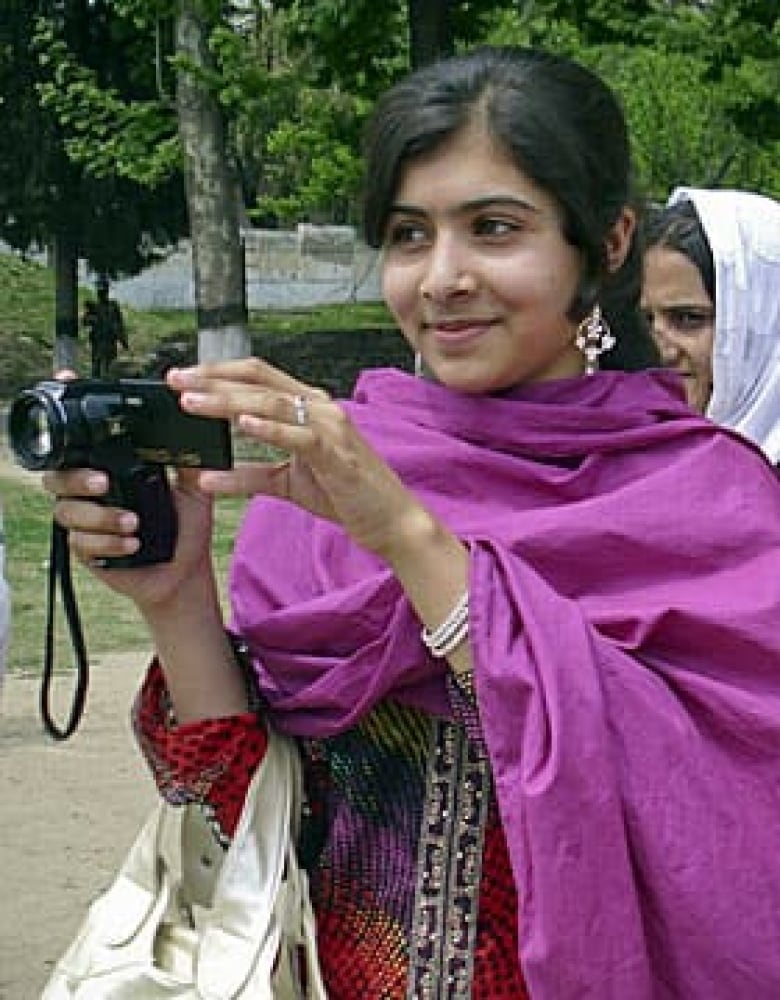The Pakistani girl who is taking on the Taliban

As much of Pakistan, and most of the world, prays for 14-year-old Malala Yousafzai to recover from a vicious Taliban attack, the Islamists say that if she lives they will come after her again.
It is a threat her family takes seriously, its members told CBC News, even as they look on their own child, recovering from a bullet wound to the head, as a potential martyr to a more progressive way of life.
No doubt by now you've read about the young activist from Pakistan's combustible Swat Valley who defied the militants, mainly just by going to school, speaking out and writing a very public blog about her dreams, which was featured for a time on the BBC's Urdu channel.
When the Swat Valley, next door to Afghanistan, was overrun by the Taliban a few years ago, schools for girls were shut down.
But spurred on by her father Ziauddin, himself a teacher and progressive activist in the region, Malala said that she would not back down, and one way or another she would get her education.

Earlier this week, though, she paid a heavy price for wanting literacy, equality and opportunity in an area that is today dominated by an ideology that sees women as a threat.
Two militants ambushed her school bus as she was returning home from classes, and shot her in the head and neck. Two other girls on the bus were shot, as almost two dozen others witnessed the atrocity.
The danger back home
Today, Malala lies recovering at a hospital in Peshawar, outside the immediate threat of the Taliban. But she and her family still have much left to fear.
Over the past two days, I've spoken with several members of Malala's family. Her cousin Mehmoodulhassan is at the hospital and he says a steady stream of visitors — friends, family, well-wishers, politicians, security officials, and dignitaries — are stopping by to see how the girl is doing.
But while he and Malala's parents are grateful for the concern and the promises of security and medical attention, they also know that back home in Swat the danger is still very real.
Another cousin, Fakhrulhassan, who stayed in Mingora, at the family residence, told me that we in the West have no idea the kind of stress that people in Swat are under.
Even though the Taliban is not officially in control of the region, he says that his family's movements are monitored by the militants, and he was reluctant to describe in detail other concerns over the phone, in case the call was being monitored.
Vigils and outrage
Fakhrulhassan says that there is no peace in this part of Pakistan, which the Taliban have used as a staging ground for their battles to regain Afghanistan almost since 2003 when they were ousted by the Americans and UN forces.
He said that while some of the family were in Peshawar at Malala's bedside, back home in Swat he could hear heavy artillery and guns firing around his home in the middle of the night.

He didn't know what the gunplay was all about. Maybe it was meant as a direct warning to Malala's family and supporters. Maybe it was for something else entirely. In that part of the world, you can never be certain, he said.
This uncertainty is the ultimate concern for the Yousafzai family, as it is for all those battling the rise of religious extremism and violence in Pakistan.
Despite everything — despite the vigils, the demonstrations, the outrage spouted by politicians all over the world — the Taliban only seems to grow in power, and goes unchallenged.
This is not the first time it has attacked schoolgirls, sometimes throwing acid in their faces. The UN documented 185 attacks on schools and hospitals in Afghanistan last year and Swat Valley has a similar record.
Will Malala's case be any different?
Popular former cricket star-turned-politician Imran Khan, who has been leading an anti-U.S. drone campaign, has condemned "the brutal terrorists" who target young girls and offered to pay for Malala's medical treatments.
But he has also been criticized for not doing enough to challenge the Taliban directly, and for wanting to "talk" with them, a notion that alienates many progressive Pakistanis.
According to Azizulhassan Yousafzai, another of Malala's cousins, "this is the basic flaw in our politicians, our system, our celebrities. They can't condemn the Taliban. Because they are afraid for their lives, and their families and their own children."
He says that challenging the Taliban and the extremist ideology is crucial, but politicians try to soft-peddle the threat by saying that not all Islamists are the same.
"They say these are good Taliban. These are bad Taliban. These are conservative. These are secular."
He called it a "drama" as in a farce or a play being presented to an audience. But according to the Yousafzai family, at least, most Pakistanis are not being fooled.
Someone's martyr
For the time being, though, Malala's family can only sit and wait. Wait, hopefully, for her recovery, and for some politician, some government in the West, some miracle to stop this tidal wave of extremism that is paralyzing their communities.
If Malala dies, there is no doubt that the extremists will see it as a victory, and celebrate in the streets, as they did when former Punjab governor Salman Taseer was assassinated by one of his own bodyguards last year for criticizing the country's blasphemy laws.
But Malala's father and family also say that if she dies the victory will be theirs, according to her cousins.
"We are proud of Malala," Azizulhassan said. "What she has done is for the nation. That is for a change. That is for the humanity. If she dies we will be proud of her."
Such is the belief system in a society where, no matter which side you are on, dying for your cause is the ultimate accomplishment.